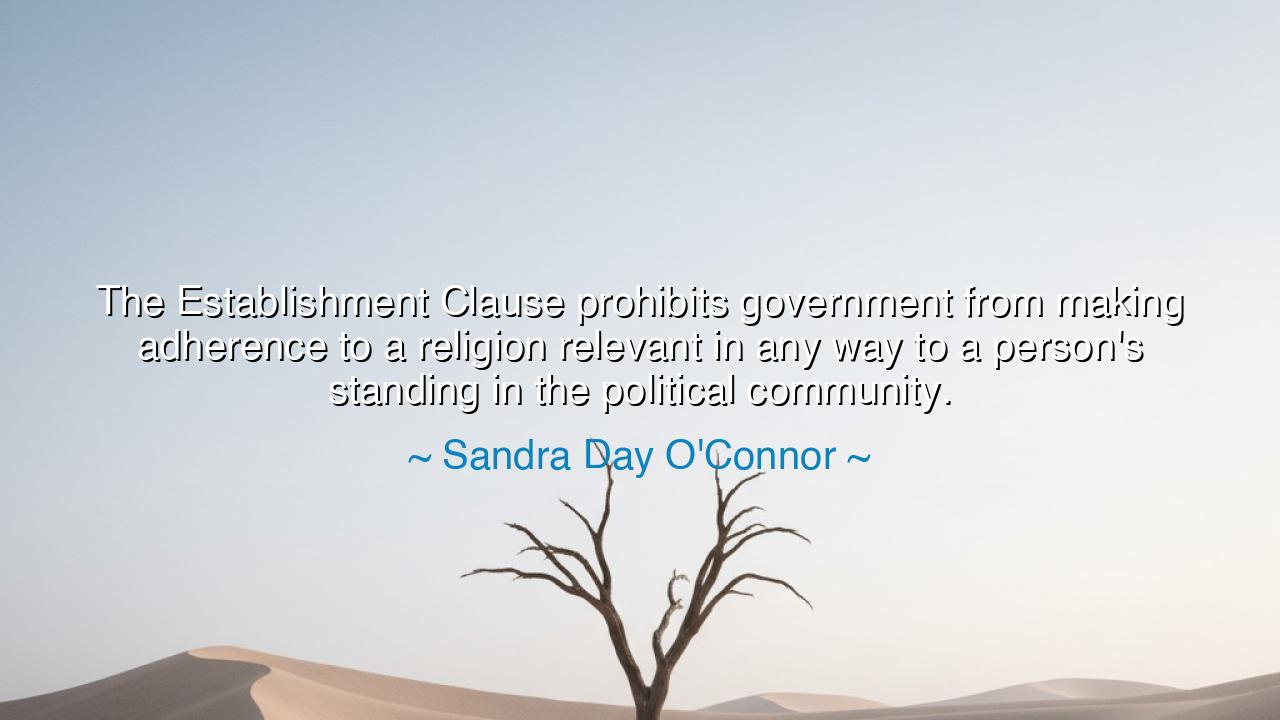
The Establishment Clause prohibits government from making
The Establishment Clause prohibits government from making adherence to a religion relevant in any way to a person's standing in the political community.






The words of Sandra Day O’Connor—“The Establishment Clause prohibits government from making adherence to a religion relevant in any way to a person’s standing in the political community.”—resound like a safeguard carved into the very foundation of a free people. They declare that the measure of a citizen is not found in creed, ritual, or prayer, but in their equal dignity as a member of the political community. In these words lies a vision of liberty as delicate as it is mighty: that the government must remain blind to matters of faith, for only in such blindness can all citizens stand as equals beneath the law.
The origin of this quote rests in the United States Constitution, in the wisdom of the First Amendment and its Establishment Clause. This clause, born from centuries of religious wars, persecutions, and alliances between throne and altar, sought to break a chain that had bound much of human history. O’Connor, as the first woman to serve on the Supreme Court, understood the enduring power of this clause to preserve the fragile balance between faith and freedom. Her judgment made plain that when government ties citizenship to religion, liberty is broken, and equality shattered.
History itself testifies to the necessity of her words. In the old kingdoms of Europe, citizenship and faith were entwined like iron and chain. To belong, one had to worship as the state commanded; to dissent was to risk exile, poverty, or death. The Edict of Nantes in France, granting Protestants limited rights, was later revoked, unleashing persecution once more. These scars of history show us why the framers of America vowed a different path. They knew that a political community rooted in equality could not survive if religious adherence determined who was honored or despised, included or excluded.
Yet O’Connor’s wisdom also addresses the present, for the temptation to make religion a measure of citizenship has never vanished. In every age, some seek to raise one creed above others, to declare that true belonging depends on sharing their faith. But as she warns, the government must never bow to this temptation. For the moment it does, unity collapses, and the community fractures into insiders and outsiders, favored and disfavored. Only neutrality—protecting all faiths equally, and preferring none—can preserve peace.
The heart of this teaching is that the state must not be the arbiter of the sacred. Faith belongs to the conscience, not the government’s hand. By making religion irrelevant to political standing, the law allows religion to flourish freely, uncoerced and unhindered. True faith needs no sword of the state; true community needs no creed imposed by law. Thus, O’Connor’s words are not only about legality, but about the dignity of conscience, the right of each soul to walk its path without fear of political penalty.
The lesson for us is clear: we must guard with vigilance the wall between church and state, not as a barrier against belief, but as a shield for liberty. If you are a believer, cherish that your faith is free; if you are not, cherish that your conscience is safe. Never allow government to weigh your worth by the temple you attend or the prayer you utter. Instead, demand that the measure of a citizen remain what it was always meant to be: one’s commitment to justice, liberty, and the shared good of the community.
Practically, this means resisting any effort to divide society along religious lines. It means defending the rights of those whose beliefs differ from your own, knowing that in defending them, you defend yourself. It means teaching future generations that citizenship is not a gift of the church, nor a badge of faith, but a birthright of freedom. And it means honoring diversity, not as weakness, but as the strength of a community where all stand equal before the law.
Thus, Sandra Day O’Connor’s words endure as a beacon: the Establishment Clause is the guardian of equality, the protector of conscience, the foundation of peace. Let us pass this truth down like a sacred inheritance—that no citizen’s worth shall ever be measured by religion, and that the true glory of a political community is found in the freedom of all its people.






AAdministratorAdministrator
Welcome, honored guests. Please leave a comment, we will respond soon